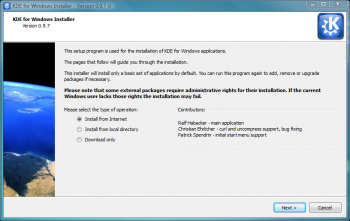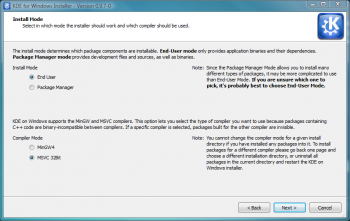Digikam/Windows/da: Difference between revisions
Importing a new version from external source |
Importing a new version from external source |
||
| Line 3: | Line 3: | ||
''Reproduceret fra Dmitri Popovs blog, 21/11 2010'' | ''Reproduceret fra Dmitri Popovs blog, 21/11 2010'' | ||
Hvis du vil installere '''digiKam''' på Windows, så har du to muligheder: du kan enten kompilere programmet fra kildekoden eller bruge '''KDE Windows installer'''. Den sidste tilgang er langt den letteste, men der er en ulempe: installeren inkluderer som regel en ældre version af '''digiKam'''. Hvis du kan leve med det og ikke har lyst til at "få snavsede finger" ved at kompilere '''digiKam''' fra kilden, så er KDE's installer vejen frem. | |||
First off, create a new KDE directory on your hard disk, grab then the KDE installer from the ''KDE on Windows'' project’s Web site, and move it into the created directory. Launch the installer, select the <menuchoice>Install from Internet</menuchoice> option, and press <menuchoice>Next</menuchoice>. | First off, create a new KDE directory on your hard disk, grab then the KDE installer from the ''KDE on Windows'' project’s Web site, and move it into the created directory. Launch the installer, select the <menuchoice>Install from Internet</menuchoice> option, and press <menuchoice>Next</menuchoice>. | ||
Revision as of 14:41, 24 November 2010
Installér digiKam på Windows
Reproduceret fra Dmitri Popovs blog, 21/11 2010
Hvis du vil installere digiKam på Windows, så har du to muligheder: du kan enten kompilere programmet fra kildekoden eller bruge KDE Windows installer. Den sidste tilgang er langt den letteste, men der er en ulempe: installeren inkluderer som regel en ældre version af digiKam. Hvis du kan leve med det og ikke har lyst til at "få snavsede finger" ved at kompilere digiKam fra kilden, så er KDE's installer vejen frem.
First off, create a new KDE directory on your hard disk, grab then the KDE installer from the KDE on Windows project’s Web site, and move it into the created directory. Launch the installer, select the option, and press .

In the field, enter the path to the KDE directory, and press . Select the option in the section, and from the Menuchoice>Compiler Mode</menuchoice> section.

Keep the settings in the next several screens at their defaults. When you reach the screen, choose the www.winkde.org server, since it offers the newest as well as older versions of the KDE bundle. Press and find the version of KDE that contains the digiKam and kipi-plugins packages. Select then both packages, and press . Hit the button once again, and the installer does the rest. Wait till the installer has finished downloading and installing the software, press the button, and you are done. Now you can launch and use digiKam as any other Windows application.
A tutorial for compiling digiKam from source is available at http://www.digikam.org/drupal/node/525
